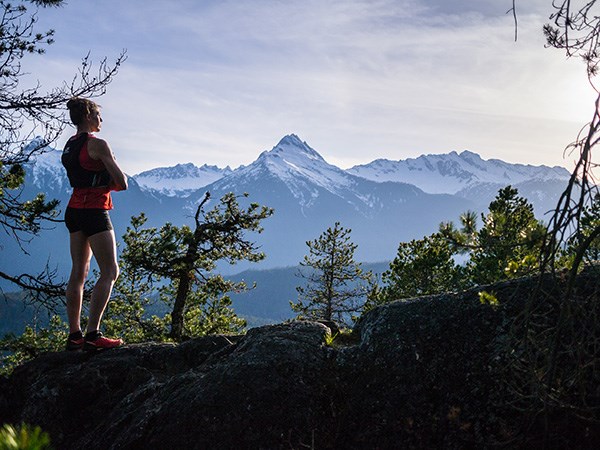It was scary, exhilarating but also a lot of fun.
I recently completed a guided course in Whistler learning the techniques to get down double black diamond ski runs. Our small group was constantly challenged to ski better on steeper and steeper slopes. Each new ski run completed left us with a new sense of accomplishment. I came away from it feeling I had really progressed as a skier.
But more than that, I was inspired by one of the individuals who skied in our group. He was a man with a salt and pepper goatee showing below his goggles and helmet. I couldn’t see the rest of his face but by the way he skied and kept up with the guide, I imagined he must have been in his early 40s.
Later, when we broke for lunch and we took our goggles off, I was surprised to discover that he was much older than I had imagined; he was at least in his early 60s. He wasn’t a veteran skier, either, who had been born into his ski bindings – he’d chosen to take up skiing in his 40s.
While we ate, he spoke up: “I know I’m holding you guys up out there. I’m sorry.” We all smirked a bit at the remark. If anything, he had been making us sweat to keep up with him. He ended by saying: “My advice to you is to never grow old like me.”
I thought to myself: If this is what old looks like, I have no issue with getting there.
But this encounter is hardly unique in southwest British Columbia. Just recently I ran a tough trail race near the Cleveland Dam called the Cap Crusher that climbs up and down steep trails over wet roots and rocks. As everyone gathered at the finish line afterwards, my legs quivering like jelly from my effort, the race director called out to give a prize to the oldest person that had completed the course. A man nearly 60 years old put up his hand and stepped forward.
I have countless other examples like this that I’ve witnessed over my years here. I’ve been overtaken on the trails by people twice my age when I’m straining to catch my breath. I’ve watched as grandmothers with grandchildren in tow passed me on their mountain bikes on the Squamish trails.
Like many of you who likely all know people similar to this, I’ve come to simply find it normal. The mountains seem to have a way of just keeping the people who continue to venture into them younger for longer.
Coming from Ireland, though, I initially found this odd. Growing up in Dublin, someone who was 60 was considered very old. I guess this is borne out of the fact that there was a low life expectancy in Ireland up until my parents’ generation. Work was hard, and diet and health were poor. I knew none of my grandparents growing up as they had all passed before I was old enough to tie my own shoelaces. I remember when my parents and their friends were in their late 40s, they’d talk about how they needed to be careful because if they fell, they’d need to replace a hip.
As I watched that guy in his 60s on the ski course catch an edge and tumble headfirst down a steep, hard slope and then pick himself up while laughing, I couldn’t help but think how odd it was that the older individuals I knew back home in Ireland had retired from any strenuous physical activities so early in their lives.
I had to ask myself, why was it different here? What was it about the British Columbia coast that made people stay younger and active longer?
After a while, I eventually realized what it was. The mountains never get easier, and people never stop wanting to play there.
As people age, playing in the mountains continues to be a part of their lives. It isn’t viewed as childish to continue hiking, camping, exploring or skiing in the wild lands beside the cities and towns. Play continues to be an important part of people’s lives. Many of the interests and activities that might have been started during youth can take decades to master fully, so what begins as a child simply playing games eventually becomes the adult wishing to perfect as a skill.
This constant progression and relationship with the wild and mountains staves off the effects of time. By keeping the mind young and the body moving, the effects of time don’t have the same impact. As individuals age, they become motivated to mentor the next generation, be it their children or grandchildren, to teach the skills they were taught to enjoy the mountains safely.
Walk through the Smoke Bluffs in Squamish on any given clear Sunday and you will likely see multiple generations of individuals climbing together and either passing on or learning that skill.
What I realized was that age and being old is largely a figment of my mind. If I believe I will be old when I’m 50, then when I get there I will be old. If I set an age for myself that defines when I need to “grow up” and give up certain pursuits, then I will.
If Neverland, the land of Peter Pan and the Lost Boys, is a place where you can choose to never grow up, then I believe I found it when I moved to Squamish and the Sea to Sky Corridor.
Keeping my mind inspired by the mountains and my body strong by visiting them often is the secret to a long life in this place. As J.M. Barrie wrote in Peter Pan: “To live will be an awfully big adventure.”




